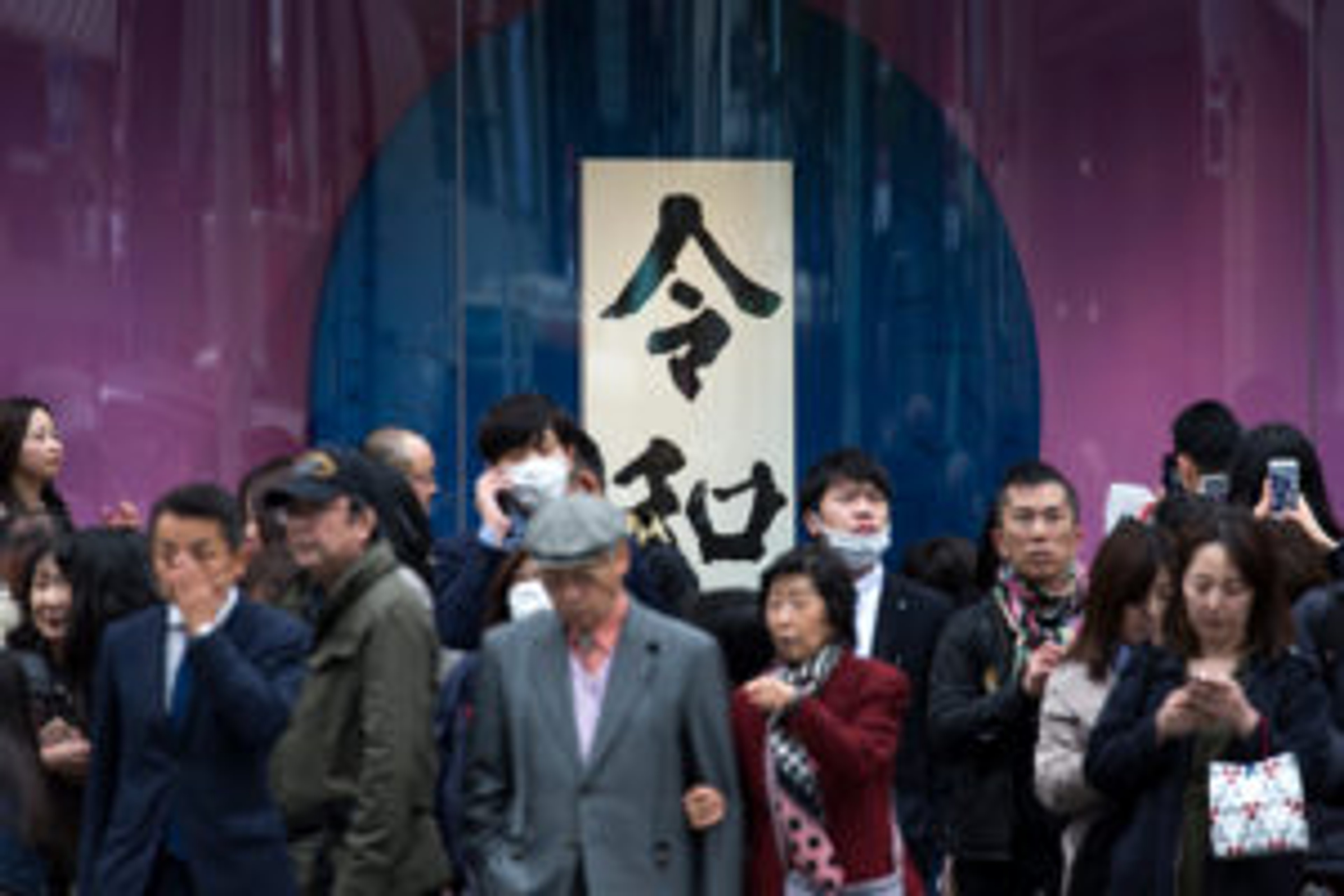With New Emperor, Japan Enters the Era of ‘Joyful Harmony’

Pedestrians walk in front of calligraphy showing the name of Japan’s next imperial era, ‘”Reiwa,” on April 01, 2019 in Tokyo. (Tomohiro Ohsumi/Getty)
Pico Iyer is the author, most recently, of Autumn Light, about life and death in his neighborhood in western Japan and, coming in September, A Beginner’s Guide to Japan.
NARA, Japan — Emperor Hirohito of Japan, who ruled from 1926 to 1989, told journalists in 1975: “From a broad point of view, I do not think there has been any change between prewar and postwar.” Could any assertion sound more startling to foreign observers? The transformation of Japan from ferocious enemy to compliant American ally — and from rapacious invader to an army-less maker of transistor radios — was one of the most profound historic changes of the 20th century.
But in Japan, adjusting to new circumstances is not the same thing as real change. Indeed, adaptation and taking what it needs from abroad — whether Buddhist culture from ancient China or shopping mall suburbia from contemporary America — has been Japan’s consistent signature for at least 13 centuries.
When Hirohito delivered that Olympian pronouncement about no change between prewar and postwar, he was perhaps expressing a wish that his throne represent continuity. Yet his son, Akihito, had quietly broken with tradition by marrying a commoner (and a Roman Catholic to boot) in the postwar years, having mastered English under an American tutor. When he replaced his father in 1989, he became the first emperor to ascend the Chrysanthemum Throne who was not seen as a god — Hirohito had agreed, at the suggestion of the American military at the end of the war, to renounce his divinity.
When Akihito retires on Tuesday, he will be the first emperor in more than two centuries to choose to step down. Yet the story of the Japanese imperial family, especially after it abandoned its official immortality, is mostly the story of individuals waving from a faraway balcony on which they look very trapped.
The man who will become emperor on Wednesday, Naruhito, has been an admirably hardworking Oxford-educated crown prince who broke with protocol by speaking out against the pressure (from the media and from within the imperial court) brought upon his wife, Masako, especially after her failure to bear a male heir. His bride, schooled at Harvard and Oxford and once one of the brightest stars in the land, has long been a barely visible ghost, diagnosed with an “adjustment disorder” and unable to perform many of her public duties.
The current empress, Michiko, long beloved by her people, likewise faced crippling pressure from the Imperial Household Agency, the government department charged with handling the emperor’s family matters, which became more powerful than ever after the emperor was deemed to be mortal. Still, Japan’s symbolic rulers enjoy a less intrusive press and fewer scandals than their counterparts in Britain. And their freedom from worldly power confers on them some of the comforting warmth of grandparents; immediately after the devastating tsunami of 2011, the emperor and empress’s kind words and visitations buoyed the nation as no politician could.
Yet even before the war, many in Japan had begun to agonize over the fear that their culture was losing its soul to the outside world. Young people are less and less eager to tend to their elders, to the point where aging couples hire actresses to impersonate their daughters, a sobering trend in a country with the world’s oldest population. Many Japanese are becoming less shy about marrying foreigners, and amid a tourist boom in the run-up to next year’s Tokyo Olympics, the streets of Kyoto look in places like an English-language Disneyland. Miss Universe Japan 2015 was criticized domestically because she is the daughter of an African American man from a U.S. naval base. The father of Miss World Japan 2016 is from India. And the latest Japanese heroine, the tennis champion Naomi Osaka, was born in Japan to a Japanese mother and a Haitian father.
There’s no question that in the imperial democracy that is Japan, the emperor represents a welcome constancy: in the 32 years I’ve been based around Kyoto, I’ve seen 17 prime ministers rise and fall. The current prime minister, Shinzo Abe, has been in power for almost seven years but citizens irked by his hawkish wish to overturn the country’s commitment to peace point out that he comes from a line of often aggressive power brokers: his father was minister of foreign affairs and his grandfather was prime minister and a member of the wartime cabinet to boot. Abe himself had already served once as prime minister before being re-elected after a gap of five years. It’s hard not to remember how the most sacred Shinto shrine in the land, in Ise, has been rebuilt every 20 years for the past 13 centuries, so it always looks the same and is never really older — or newer — than before.
The era marked by the coming emperor will be called “Reiwa,” which roughly translates to “joyful harmony.” It will bring to an end the Heisei period, or time of “achieving peace,” which was distinguished by almost 30 years of recession and a dramatic fall from global power. Most of my friends in Kyoto don’t complain about the imperial family; instead, they seem to feel a sense of sympathy for their remote rulers from the far side of a moat. As the Japanese calendar opens to the year Reiwa 1, it’s hard not to think that constancy might be a nice word for stubbornness and continuity for stagnation.